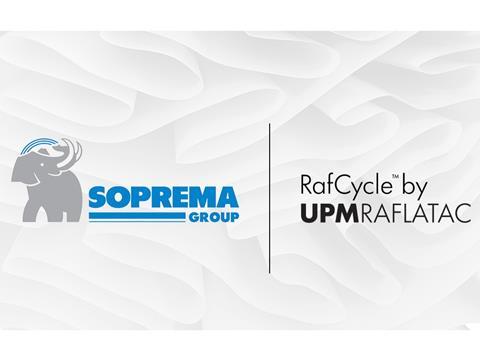
UPM Raflatac has named Soprema as its main partner in label waste recycling in the EMEIA region, with label waste collected through the RafCycle recycling service set to be converted into new construction and insulation materials.
Soprema is a roofing and insulation specialist with 123 manufacturing sites and over 120 subsidiaries across the world. Using label waste collected through UPM Raflatac’s RafCycle service, it will create materials to enhance energy efficiency in buildings – including cellulose wadding for attic insulation, which is said to offer high performance in a range of weather conditions.
Therefore, the collaboration hopes to uplift the use of renewable sources at Soprema’s site in France and the construction industry as a whole. Soprema’s management team states that the joint effort ‘will let Soprema take a new step forward in the integration of the release liner as raw material for an insulation product that is more effective for all-season thermal comfort’.
UPM Raflatac has set its sights on becoming the first label materials company to ‘go beyond fossils’ and aims to help companies meet their sustainability targets by recycling their liner waste via RafCycle.
Juha Virmavirta, director, RafCycle, UPM Raflatac, comments: “We are excited to announce this partnership with Soprema, as collaboration is key in the circular economy. This cross-industry collaboration not only supports the recycling of liner waste, but also allows us to continue providing solutions to avoid other disposal methods such as incineration or landfill. The first collections of RafCycle label waste have already been delivered to Soprema.”
The announcement comes after UPM Raflatac’s previous partnership with Inosence Polyol and Finnfoam, in which PET plastic liner waste collected via RafCycle was processed into a raw material to produce insulation.
In a seed funding round led by Metsä Spring earlier this year, Finnish start-up Fiberwood received funding to scale up production capabilities at its pilot plant. Fiberwood utilizes side streams from the mechanical wood industry to produce insulation and packaging materials.
Additionally, Berry Global’s flexible films division has apparently implemented up to 30% post-consumer recycled material into its FormiFor insulation compression film, which packages insulation and glass and stone wool.
If you liked this article, you might also enjoy:
The L’Oréal approach to packaging sustainability
The way we talk about plastic needs to change – here’s how to get it right
What steps is Apple taking to make its packaging more sustainable?














No comments yet